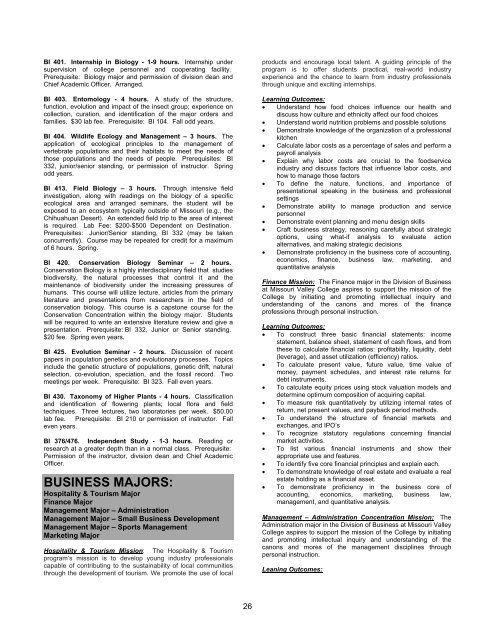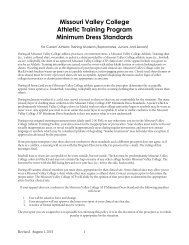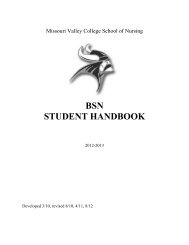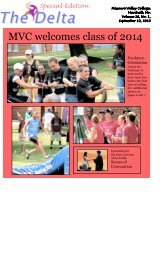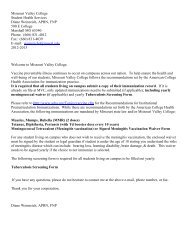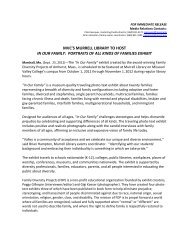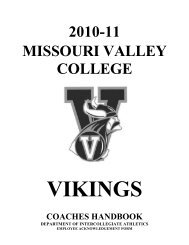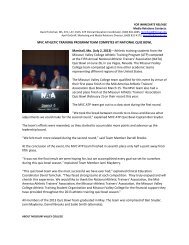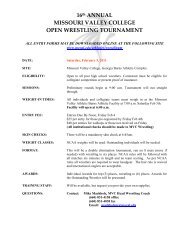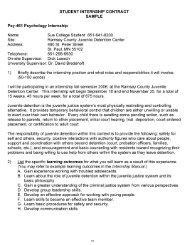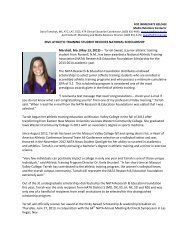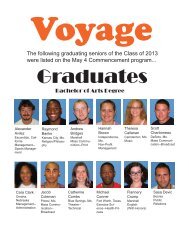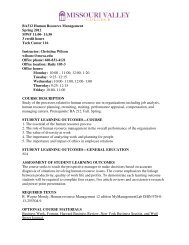2012-13 Undergraduate Catalog - Missouri Valley College
2012-13 Undergraduate Catalog - Missouri Valley College
2012-13 Undergraduate Catalog - Missouri Valley College
You also want an ePaper? Increase the reach of your titles
YUMPU automatically turns print PDFs into web optimized ePapers that Google loves.
BI 401. Internship in Biology - 1-9 hours. Internship under<br />
supervision of college personnel and cooperating facility.<br />
Prerequisite: Biology major and permission of division dean and<br />
Chief Academic Officer. Arranged.<br />
BI 403. Entomology - 4 hours. A study of the structure,<br />
function, evolution and impact of the insect group; experience on<br />
collection, curation, and identification of the major orders and<br />
families. $30 lab fee. Prerequisite: BI 104. Fall odd years.<br />
BI 404. Wildlife Ecology and Management – 3 hours. The<br />
application of ecological principles to the management of<br />
vertebrate populations and their habitats to meet the needs of<br />
those populations and the needs of people. Prerequisites: BI<br />
332, junior/senior standing, or permission of instructor. Spring<br />
odd years.<br />
BI 4<strong>13</strong>. Field Biology – 3 hours. Through intensive field<br />
investigation, along with readings on the biology of a specific<br />
ecological area and arranged seminars, the student will be<br />
exposed to an ecosystem typically outside of <strong>Missouri</strong> (e.g., the<br />
Chihuahuan Desert). An extended field trip to the area of interest<br />
is required. Lab Fee: $200-$500 Dependent on Destination.<br />
Prerequisites: Junior/Senior standing, BI 332 (may be taken<br />
concurrently). Course may be repeated for credit for a maximum<br />
of 6 hours. Spring.<br />
BI 420. Conservation Biology Seminar – 2 hours.<br />
Conservation Biology is a highly interdisciplinary field that studies<br />
biodiversity, the natural processes that control it and the<br />
maintenance of biodiversity under the increasing pressures of<br />
humans. This course will utilize lecture, articles from the primary<br />
literature and presentations from researchers in the field of<br />
conservation biology. This course is a capstone course for the<br />
Conservation Concentration within the biology major. Students<br />
will be required to write an extensive literature review and give a<br />
presentation. Prerequisite: BI 332, Junior or Senior standing.<br />
$20 fee. Spring even years.<br />
BI 425. Evolution Seminar - 2 hours. Discussion of recent<br />
papers in population genetics and evolutionary processes. Topics<br />
include the genetic structure of populations, genetic drift, natural<br />
selection, co-evolution, speciation, and the fossil record. Two<br />
meetings per week. Prerequisite: BI 323. Fall even years.<br />
BI 430. Taxonomy of Higher Plants - 4 hours. Classification<br />
and identification of flowering plants; local flora and field<br />
techniques. Three lectures, two laboratories per week. $50.00<br />
lab fee. Prerequisite: BI 210 or permission of instructor. Fall<br />
even years.<br />
BI 376/476. Independent Study - 1-3 hours. Reading or<br />
research at a greater depth than in a normal class. Prerequisite:<br />
Permission of the instructor, division dean and Chief Academic<br />
Officer.<br />
BUSINESS MAJORS:<br />
Hospitality & Tourism Major<br />
Finance Major<br />
Management Major – Administration<br />
Management Major – Small Business Development<br />
Management Major – Sports Management<br />
Marketing Major<br />
Hospitality & Tourism Mission: The Hospitality & Tourism<br />
program’s mission is to develop young industry professionals<br />
capable of contributing to the sustainability of local communities<br />
through the development of tourism. We promote the use of local<br />
products and encourage local talent. A guiding principle of the<br />
program is to offer students practical, real-world industry<br />
experience and the chance to learn from industry professionals<br />
through unique and exciting internships.<br />
Learning Outcomes:<br />
Understand how food choices influence our health and<br />
discuss how culture and ethnicity affect our food choices<br />
Understand world nutrition problems and possible solutions<br />
Demonstrate knowledge of the organization of a professional<br />
kitchen<br />
Calculate labor costs as a percentage of sales and perform a<br />
payroll analysis<br />
Explain why labor costs are crucial to the foodservice<br />
industry and discuss factors that influence labor costs, and<br />
how to manage those factors<br />
To define the nature, functions, and importance of<br />
presentational speaking in the business and professional<br />
settings<br />
Demonstrate ability to manage production and service<br />
personnel<br />
Demonstrate event planning and menu design skills<br />
Craft business strategy, reasoning carefully about strategic<br />
options, using what-if analysis to evaluate action<br />
alternatives, and making strategic decisions<br />
Demonstrate proficiency in the business core of accounting,<br />
economics, finance, business law, marketing, and<br />
quantitative analysis<br />
Finance Mission: The Finance major in the Division of Business<br />
at <strong>Missouri</strong> <strong>Valley</strong> <strong>College</strong> aspires to support the mission of the<br />
<strong>College</strong> by initiating and promoting intellectual inquiry and<br />
understanding of the canons and mores of the finance<br />
professions through personal instruction.<br />
Learning Outcomes:<br />
To construct three basic financial statements: income<br />
statement, balance sheet, statement of cash flows, and from<br />
these to calculate financial ratios: profitability, liquidity, debt<br />
(leverage), and asset utilization (efficiency) ratios.<br />
To calculate present value, future value, time value of<br />
money, payment schedules, and interest rate returns for<br />
debt instruments.<br />
To calculate equity prices using stock valuation models and<br />
determine optimum composition of acquiring capital.<br />
To measure risk quantitatively by utilizing internal rates of<br />
return, net present values, and payback period methods.<br />
To understand the structure of financial markets and<br />
exchanges, and IPO’s<br />
To recognize statutory regulations concerning financial<br />
market activities.<br />
To list various financial instruments and show their<br />
appropriate use and features.<br />
To identify five core financial principles and explain each.<br />
To demonstrate knowledge of real estate and evaluate a real<br />
estate holding as a financial asset.<br />
To demonstrate proficiency in the business core of<br />
accounting, economics, marketing, business law,<br />
management, and quantitative analysis.<br />
Management – Administration Concentration Mission: The<br />
Administration major in the Division of Business at <strong>Missouri</strong> <strong>Valley</strong><br />
<strong>College</strong> aspires to support the mission of the <strong>College</strong> by initiating<br />
and promoting intellectual inquiry and understanding of the<br />
canons and mores of the management disciplines through<br />
personal instruction.<br />
Leaning Outcomes:<br />
26


